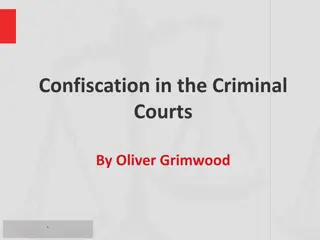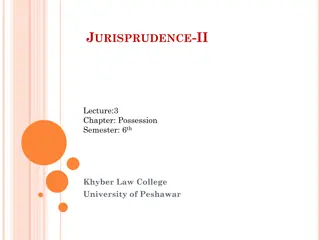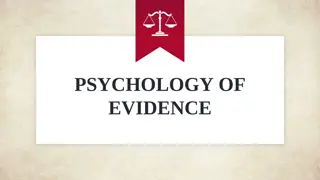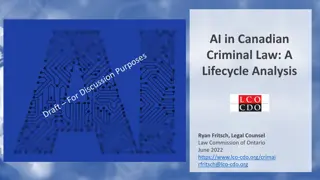Understanding Culpability and Intention in Criminal Liability
Culpability is essential in determining criminal liability, going beyond mere action to include a blameworthy state of mind. Factors such as mental illness or age can impact culpability. Intention, comprising cognitive and conative elements, plays a crucial role. Different forms of intention, including direct and indirect, influence criminal intent.
Download Presentation

Please find below an Image/Link to download the presentation.
The content on the website is provided AS IS for your information and personal use only. It may not be sold, licensed, or shared on other websites without obtaining consent from the author. Download presentation by click this link. If you encounter any issues during the download, it is possible that the publisher has removed the file from their server.
E N D
Presentation Transcript
MR. GOMOTSEGANG MR. GOMOTSEGANG MOKOKA MOKOKA CRW1501 CONTACT LECTURE
CULPABILITY The mere fact that a person has committed an act that complies with the definitional elements and is unlawful is not sufficient to render him criminally liable. X s conduct must have culpability. i.e. he must have committed the unlawful act with a blameworthy state of mind. In the following circumstances, X CANNOT be blamed for his conduct: been accompanied by
CULPABILITY (continued) A mentally ill ( insane) person or six year old child who has committed an unlawful act cannot be blamed for that act, since they cannot be expected to act lawfully. X`s conduct cannot be described as blameworthy if, X just took his partner s vehicle without her consent by simply driving off to the shops, X in this regard had no intention to steal the vehicle, therefore he cannot be found guilty of theft. This is simply because X is unaware of his unlawful conduct.
CULPABILITY (continued) NB. The fundamental question that one must ask is, whether this particular person considering his personal characteristics, talents, shortcoming, knowledge can be blamed for his commission of the unlawful act. The most commonly used Latin term is mens rea or fault or INTENTION. aptitudes, abilities gifts, and mental
INTENTION INTENTION Intention, consists of two elements, namely: Cognitive and Conative Cognitive element: consist of X s knowledge or awareness of: the act (or the nature of the act), the existence of the definitional elements & the unlawfulness of the act Conative element: consists in X `s directing his will towards a certain act results. For example, X is executing what has been in his thoughts or imagination. X takes the gun and shoots at Y, and Y dies instantly.
INTENTION (continued) Definition A person acts or causes a results intentionally if, * he wills the act or result *in the knowledge Defined more concisely, we can say that intention is to know and to will an act or the results.
INTENTION (continued) Intention may take the following forms: Direct intention (dolus directus) Indirect intention (dolus indectus) Dolus eventualis or intention by foresight. In any crime that requires intention as a requirement, it will be satisfied if X executed his act by complying with one of the above forms.
DIRECT INTENTION DIRECT INTENTION Definition A person acts with direct intention if the causing of the forbidden results is his aim or goal. X want to kill Y. X takes his revolver, presses it against Y `s head and pulls the trigger. The shot goes off and strikes Y in the head. Y dies instantly. This is dolus directus.
INDIRECT INTENTION Definition Indirect intention (dolus indirectus) A person acts with indirect intention if causing of the forbidden result is not his main aim or goal, but he realizes that, in achieving his main aim, his conduct will necessary cause the result in question. X`s merchandise is insured and is stored in Y`s building. To obtain the insurance money, X sets the merchandise on fire, fully realizing that the building itself, of necessity will catch alight. X may be charged with Arson because he had the intention to set a building on fire.
DOLUS EVENTUALIS Dolus eventualis Definition- A person act with dolus eventualis if the causing of the forbidden result is not his main aim, but: he subjectively foresees the possibility that, in striving towards his main aim, his conduct may cause the forbidden result and he reconciles himself to this possibility.
Dolus eventualis (continued) It is often said that X must have been reckless with regard to performance of the act or the causing of the results Dolus eventualis is extremely important in criminal law.
Dolus eventualis (continued) In practice, we will recall the case of S v Pistorius, where there was much emphasis on this form of intention. e.g. X disconnects sections of a railway tract in order to derail a train. He does not desire to kill other people, because his immediate goal is to commit sabotage and, in this way, to express the resentment he feels towards the state. He is nevertheless aware of the possibility that people may die if the train is derailed but he reconciles himself to this possibility. If he succeeds in derailing the train and people die, it is futile for him to allege that he did not intend to kill people.
TEST FOR INTENTION The test for intention is purely subjective. The court must determine what the state of mind of that particular person the accused (X) was when he committed the act. X `s state of mind at the time of the commission of an unlawful act, i.e. whether he had intention at that point. The onus of proof lies with the court; they must prove intention either directly or indirectly. Direct proof may take the form of a Confession.
CONTEMPORANEITY The culpability and the unlawful act must be contemporaneous. This means that in order for a crime to have been committed, there must have been culpability on part of X at the very moment when the unlawful act was committed.
CRIMINAL CAPACITY CRIMINAL CAPACITY Definition: The term criminal capacity refers to the mental abilities or capacities that a person must have in order to act with culpability and to incur criminal liability. A person is endowed with criminal capacity if he has the mental ability to appreciate the wrongfulness of his act or omission, and act in accordance with such an appreciation of the wrongfulness of his act or omission.
CRIMINAL CAPACITY (continued) CRIMINAL CAPACITY (continued) NB- The two psychological components / legs of the test for criminal capacity: Cognitive (Ability to appreciate wrongfulness) Conative (ability to act in accordance with such appreciation). Defences excluding criminal capacity: The defence of mental illness, which is dealt with statutorily in sections 77 to 79 of the Criminal Procedure act 51 of 1977 The defence of youthful age.
MISTAKE MISTAKE Remember the principle that if X is unaware of any of the elements of a crime (act, unlawfulness, definitional elements), it cannot be said that he intended to commit the crime. If such knowledge or awareness is absent, it is said that there is a mistake or error on the part of X. He imagined the facts to be different from what they, in fact, were. In other words, mistake exclude or nullifies the existence of intention.
MISTAKE (continued) MISTAKE (continued) The following are two example of mistake relating to the act or the nature of the act. Within the context of the crime of malicious injury to property, X is under the impression that he is fixing the engine of Y s car, whereas what he is, in fact, doing to the engine amounts to damaging it. Within the context of the crime of bigamy, X thinks she is participating in a communion service in a church, whereas the service in which she is participating is, in fact, a marriage ceremony.
MISTAKE (continued) MISTAKE (continued) The following are two examples of mistake relating to circumstances set out in the definitional elements. X is hunting game at dusk. She sees a figure that she thinks is a buck, and shoots at it. It turns out that she has killed a human being. Within the context of the possessing drugs, x thinks that the container containing powder that she received from a friend is snuff, which she can use as a cure for a certain ailment, whereas in fact, it contains matter listed in the statute as a drug that may not be possessed. statutory crime of unlawfully
MISTAKE (continued) MISTAKE (continued) The mistake needs to be reasonable. This principle means that, whether there was really a mistake that excludes intention is a question of fact. What must be determined is X s true state of mind and perception of fact. The test in respect of intention is subjective. The question is not whether a reasonable person in X`s position would have made the mistake. Mistake must be material. Mistake can exclude intention (and therefore liability) only if it is a mistake concerning an element or requirement of the crime other than the culpability requirement itself. These requirements are the act, the definitional elements, or the unlawfulness requirement.
MISTAKE (continued) MISTAKE (continued) Where X is mistaken about the object of her act. Such mistake is known in legal literature as error in objecto. eg. If X is out hunting and thinks she is shooting at a buck, when she is actually shooting at Y, then X then made a mistake with regard to the object of her act(error in objecto ).
ABERRATIO ICTUS ABERRATIO ICTUS The going astray of the blow (ABERRATIO ICTUS ) does not constitute a mistake . This is not a form of mistake , but a term to refers to a situation where the bullet shot by the accused, does not strike the intended victim but someone else, or the accused (X) aims a blow at Y but mistakenly strikes a third party instead . The bullet going astray or the misdirected blow could be due to the accused `s clumsiness or lack of skill .
ABERRATIO ICTUS (continued) ABERRATIO ICTUS (continued) Examples. X wants to kill Y, she shoots at Y, But the bullet is deflected by a stone, misses Y and hits Z instead. South African courts have laid down the following guidelines with regard to these aberratio ictus situations:
ABERRATIO ICTUS(continued) ABERRATIO ICTUS(continued) It will be accepted that X had an intention to murder z if X foresaw that the shot or blow could hit and kill Z, but the bullet is deflected. (dolus eventualis) X knew that her shot or blow could hit and kill Y and Z (dolus directus) As regards Y, the person that X initially wanted to murder, X could be charged with the attempted murder of Y.


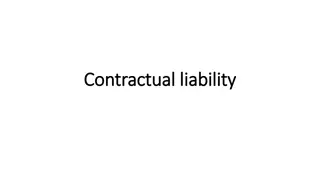

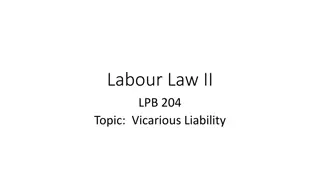


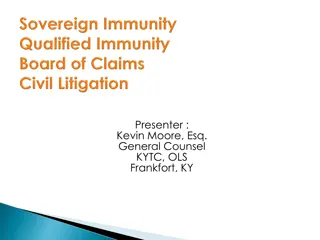
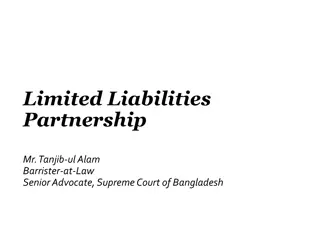





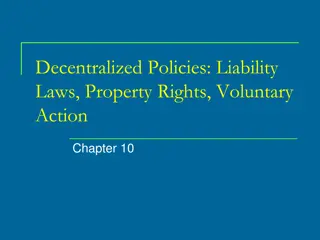

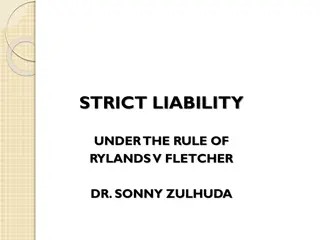



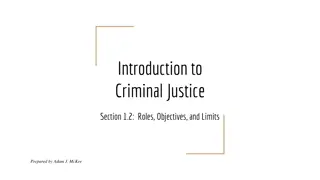
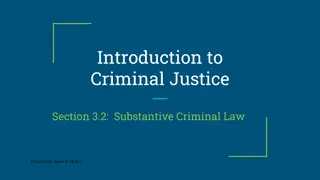

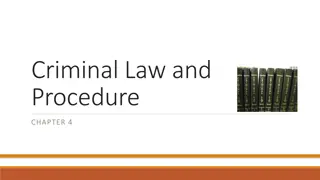



![Briefing on the Criminal Procedure Amendment Bill [B12-2021] to the Portfolio Committee on Justice and Correctional Services](/thumb/157093/briefing-on-the-criminal-procedure-amendment-bill-b12-2021-to-the-portfolio-committee-on-justice-and-correctional-services.jpg)
